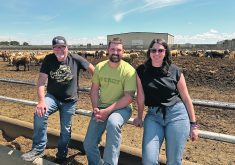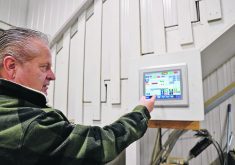Fear can be a significant stumbling block when families determine how to pass on the farming operation
Slicing up a business, sorting out insurance and taxes and legal agreements is not easy. But it might be a little bit easier than dealing with the emotions that come with farm succession.
One of those emotions is fear, says Colleen Younie, farm business management officer with Agriculture Resource, Agriculture and Fisheries in Prince Edward Island.
“For the founding generation, there’s fear of loss of control and a fear of making wrong decisions and, I think parents may fear the successor is not ready.”
Read Also

U.S. loses out on sales of soybean to China
U.S. soybean exporters risk missing out on billions of dollars worth of sales to China this year as trade talks drag on and buyers in the top oilseed importer lock in cargoes from Brazil.
And, here’s a well-kept secret: some parents don’t want their kids to farm. They’ve struggled with high expenses and low returns and they don’t want that for their kids, she says.
There are four other stories in this Strategies series:
- Navigating farm succession: a tool kit
- Following key steps makes planning easier
- Price of a lifetime
- Incorporation may offer one solution to succession
Better prices for commodities in recent years have helped, but parents still worry.
Then there’s that nebulous sense of dread that nudges baby boomers awake in the wee small hours saying, ‘I am no longer a farmer. Now I’m going to die.’
“I think that some people think of themselves as either farming full time or retired. They don’t necessarily see succession as a progression or a process,” says Younie. “It’s like one day I’m going to be farming and the next I’ll be retired and I can’t see myself doing that and so….”
Fear of confrontation is another road block for all concerned. Human beings have a tendency to avoid confrontation with loved ones.
And when it comes to inheritance, conflict can rear its head, Younie says.
It’s natural for parents to feel that the children have to be treated equally, that each child must get the same share, but that is unrealistic.
If equality is indisputable, the farm will likely have to be sold, she says.
But there are ways to even the situation a bit, she adds.
Parents may be able to buy a life insurance policy naming non-farming children as beneficiaries or they may be able to give them a few acres of land on which to build a house.
“It’s not necessarily anywhere near an equal portion but it helps you feel as a parent you’ve been a little bit fair,” she says.
In a perfect world, successors would be poised to take over at the same time as founders are ready to turn over the reins. In real life, successors are more often ready to take over before the founders are ready to let go.
How that situation is dealt with depends on how the family functions and how it has functioned, says Younie.
Sometimes, the younger generation goes to Mom, because she’s the communicator, and sometimes she’s easier to talk to than Dad.
“It’s a cliché but you have to figure out how to communicate,” she says.
The children may have to work on the farm for a time before they get a chance to be an owner. Some of them may not want to take that risk if there’s no guarantee they will be an owner, or when they will be an owner.
This is where a facilitator comes in. A third party is an excuse to have the conversation, Younie says.
“A facilitator is free to ask difficult questions.”
















